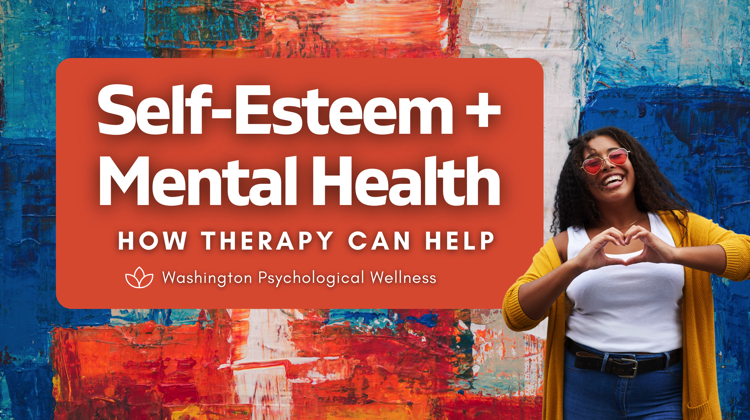
What is Self-Esteem?
Self-esteem determines how much we like ourselves, how confident we are, and how capable and valued we feel in general.
People with high self-esteem generally feel good about themselves, their abilities and feel deserving of love, intimacy, and respect. These individuals are more likely to set and pursue goals while maintaining an overall positive outlook on life.
Furthermore, unlike their lower self-esteem counterparts, individuals with high self-esteem demonstrate more resiliency and can better overcome challenges without over-internalizing criticism or judgment. What is self-esteem
Causes of Low Self-Esteem
The causes for low self-esteem are manifold and may include childhood trauma, parenting, societal norms/pressures, and more.
Childhood & Parenting.
For children, low self-esteem may manifest as a result of experienced and internalized bullying, criticism, invalidation, or abuse.
For example, children are heavily affected by their parents. Suppose a parent is unsupportive, ignores their child’s accomplishments, or sets unrealistic standards and expectations. In that case, their child is more likely to internalize their self-worth with negativity, shame, guilt, and overall low self-esteem.
Even the most supportive parents can hurt their children by being overly critical or perfectionistic. It is imperative that children feel empowered, listened to, safe, and validated to develop a secure attachment, which will ultimately enhance their self-esteem and self-worth.
Societal Pressures.
Societal pressures and demands also impact self-esteem.
For instance, a child who is consistently isolated or bullied at school may internalize the rejection, associating it with a negative measure of self-worth and esteem.
Even more, lowered self-esteem can lead to a cyclical pattern of avoiding socialization, which further reinforces one’s feelings of being different from or not good enough others.
In this case, one’s self-esteem is further lowered, eventually trickling into other life areas such as work, romantic partnerships, parenting, etc.
Social Media.
Social media and unrealistic beauty standards may be another culprit for lowered self-esteem. A constant bombardment of unrealistically photoshopped social media selfies can distort realistic ideals for body image and beauty.
The more one views these images, the more dissatisfied they are likely to become with their appearance.
To compensate, one may resort to extreme measures, such as plastic surgery, as an attempt to reach this ideal. The problem is the ideal is just that, an unrealistic grasp for perfection that is impossible to achieve.
Alas, one’s self-esteem continues to dwindle not only in terms of body image but also in other life areas.
Further causes for low self-esteem may include traumatic life events, breakups, loss, or changing life circumstances. A lack of intimacy or close relationships, or even confusion about one’s career aspiration may be grounds for lowered self-esteem.
While some can move on unscathed by these potential self-esteem lowering triggers, others are more vulnerable to internalizing.
What Are the Consequences of Poor Low-Self Esteem Management?
Individuals with low self-esteem tend to feel less worthy.
They may also have more difficulty achieving their goals as they tend to focus on their limitations and negative self-aspects.
Additionally, these individuals may struggle to put themselves before others or maintain healthy boundaries in relationships.
As a result, those with low self-esteem are more likely to compromise their health, relationships, and career aspirations, leading to depression, anxiety, social isolation, and feelings of rejection.
Do I need Therapy for Low Self-Esteem?
So, we know the importance of self-esteem and its impact on all areas of life. But now what? How do we know whether self-esteem therapy is right for us?
Here is a list of questions to consider if you or someone you know is debating whether to seek self-esteem therapy:
- Does your self-esteem affect your ability to interact with others, attend social events or develop close relationships?
- Do you have difficulty setting goals or accomplishing tasks due to perceived inabilities or faults?
- Do you struggle with setting boundaries or standing up for yourself?
- Have feelings of insecurity or self-doubt made it difficult for you to succeed in tasks, relationships, or personal growth?
- Have your health, work, relationships, or lifestyle habits been affected by your self-esteem?
- Do you experience depression, anxiety, or other issues as a result of your self-esteem?
- Do you blame yourself and your abilities as an individual in response to mistakes, judgment, or failures?
If you answered “yes” to one or more of these questions, therapy might be a good option for you.
How Can Therapy Help My Low Self-Esteem?
The therapists at Washington Psychological Wellness understand the impact low self-esteem can have on overall well-being and functioning.
Though low self-esteem may be seen as a weakness or something to be ashamed of, know you are not alone.
Our therapists will help you explore your feelings in a safe, secure, and non-judgmental environment.
We specialize in assisting individuals in identifying and building a healthy self-esteem level tailored towards meeting their life circumstances and goals.
During your sessions, you and your therapist will work together to determine the underlying causes of your low self-esteem. You will gain insights into the detrimental impact low self-esteem may have had in various aspects of your life, including relationships, work/school, goal setting, motivation, socialization, etc.
Our therapists will alleviate any concerns you may have about the therapeutic process and cater to your individualized emotions, goals, and overall life circumstances.
What Are My Next Steps?
One’s self-esteem level is not a set marker and may fluctuate with time, circumstances, life transitions, and events. Addressing the issues that accompany low self-esteem will take time to work through.
At Washington Psychological Wellness, your therapist will help you determine the root cause of your low self-esteem and work with you to develop coping skills and strategies to help you in life.
Our therapists will help you approach obstacles as they arise and work with you to build sustainable solutions and habits for self-improvement, love, and growth.
